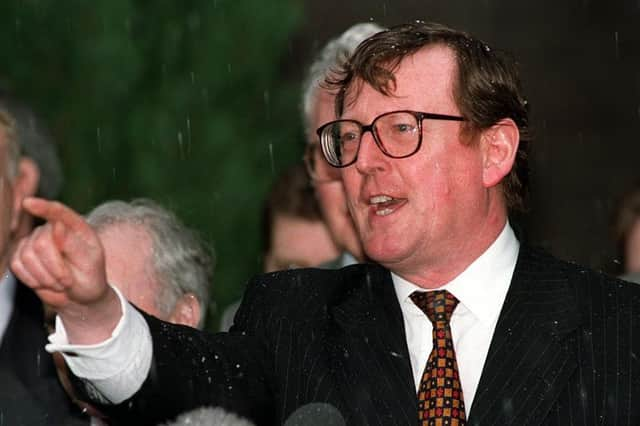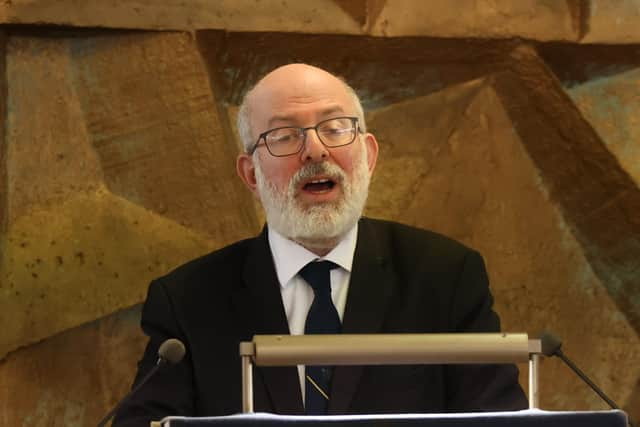David Trimble: ‘Death has finally brought him the respect he deserves’


David Trimble, whose earthly remains lie before us today, was the most prestigious and substantial figure thrown up by Unionism since the foundation of Northern Ireland in 1921.
The first to enjoy a global reputation. The distinguished congregation gathered here today in this Kirk at short notice in August is proof positive of one thing - that the title of David’s biography, Himself Alone, is in some urgent need of revision.
Advertisement
Hide AdAdvertisement
Hide AdFor David has never been less alone. In death he is finally being accorded the respect and love from all polities and communities in these islands; the respect and love in death which he deserves which he did not always receive in life when he was at the height of his powers -- and operating, as he so very often did, in most adverse circumstances. Those adverse circumstances obtained within his own party and community, within all wings of Northern nationalism, and within three governments in London, Dublin, and Washington, which did not always have Unionist interests at heart. David might have possessed the moral high ground, but it was armed republicans who often enjoyed the inside track. No other leader who played a key part in forging the Belfast Agreement had to contend with his range of challenges.


When I started composing this address, I sought the advice of a number of people, pre-eminently Daphne and she replied to me “speak as if David was here and speak with the candour and honesty of the man.” I will follow her advice and I will start with this question. So what were the qualities in David Trimble the man that made him a great politician and a great statesman?
As a man, he presents a complex picture. Everyone here knows that he was not an easy man in the conventional sense. But if he had been an easy man and an easygoing man, he could not have achieved what he did. If one looks back at his professional and public life, nothing came easily to him. Even to speak about him now is not an easy task. To the very end, there was nothing “politically correct” about David. He was never co-opted into the easy ideology of conflict resolution - as are so many peacemakers across the world when they go into retirement. He was thran, even spiky.
But the flip side was an unmatched tenacity, a resilience which stood him in excellent stead throughout the terrorist violence of the Troubles which took the lives of a number of colleagues and students at Queen’s University. That toughness made him resolute in the face of physical threats after the Belfast Agreement from Loyalists and Republicans, and also made him undaunted by a range of accusations from detractors within his own community, from within pan-Nationalism, and from a range of outside commentators. These included the idea that he was a “Lundy” or a traitor to his own folk; that he “didn’t want a Fenian about the place” -- that he would not share power with Catholics; and that he had not “sold” the Belfast Agreement hard enough to his own community and party.
Advertisement
Hide AdAdvertisement
Hide AdWhen he became leader of the Ulster Unionist Party in 1995, David McKittrick wrote in The Independent that “25 years in politics have left no real indication that he has a vision beyond Unionism and Orangeism”. Ruth Dudley Edwards, David’s greatest defender, put this question to him -- and David replied, “all will soon become clear.”
All soon did become clear. He proved his critics wrong. But he had to do so at his own pace and in his own style. Like the former law lecturer that he was, he let his students to infer the meaning of his lessons, rather than ram it down their throats. Although at times he could be irritable, even ill tempered, on the big strategic questions of the day he was cool as a cucumber. So cool that he didn’t even let moments of triumph turn his head. I remember that on the day that he and Seamus Mallon were elected First and Deputy First Ministers, a Channel 4 film crew asked him “how do you feel about this historic day Mr Trimble?” “Fed up with hearing it’s a historic day”, replied David.
His detractors dismissed such a sides as ungracious, but it was just a sign of his modesty. There was a job to do. He wasn’t there to blow his own trumpet. When once I asked him what his triumph in winning the Nobel Peace Prize with John Hume of the SDLP, he played it down mordantly saying “it’s just the statesman’s equivalent of an appearance in Hello! Magazine”.
His wit marked his greatest possession, his intellect. This made him an object of suspicion. For some colleagues, who dismissed his vast range of reading as mere “boffinry”, and he you believed he could learn anything from a book. As a teenager, he learned to drive his Rover 90 from the manufacturers’ manual and promptly crashed it on its first outing. He did not drive again until well into his 40s.
Advertisement
Hide AdAdvertisement
Hide AdBut that intellect was the making of him. It gave him the fluency and plausibility to be the first leader of Unionism to make a sustained case for that cause to the wider world, and to argue the case for a New Unionism to the Unionists of Northern Ireland. Most important of all, that intellectual self-confidence enabled him to work out why he himself could sign up for the Belfast Agreement in 1998. He was the only Unionist leader to have a serious interest in Republican history, and to have considered the effects of his actions on the internal balance of forces within the Republican movement.
His legal and political intellect also meant that he saw the irredentist Articles 2 and 3 of the Irish Republic’s 1937 constitution as a violation of international norms. For him, a key building block of peace was the emergence of a modernising Fianna Fail Taoiseach in Bertie Ahern, who respected international norms and revised the Irish Constitution as part of a balanced accommodation on the island of Ireland. He would be delighted that Bertie Ahern is here today - and I know he would wish to acknowledge his salient part in the key constitutional provisions of the Belfast Agreement.
Certainly, David loved the law. But his greatest public love was for our Westminster Parliament, its highways and its byways. Until very recently, he would take friends onto the roof of the Palace of Westminster, between Big Ben and the Victoria Tower, and would declare as if you were on his first visit, “isn’t this marvellous?”
Unlike Sir James Craig, the founding Prime Minister of Northern Ireland, and the predecessor as leader of Unionism who David most admired, David could never say that he was an Orangeman first and a Member of Parliament second. In his Nobel Prize speech, drafted by his friend, Eoghan Harris, he spoke of Edmund Burke, the Irishman for whom immersion in the larger forum of the British Parliament allowed his full genius to flourish. David might well have been speaking of himself.
Advertisement
Hide AdAdvertisement
Hide AdFor a loner, he was a great believer in institutions and processes. After the triumph of the Belfast Agreement, however, he had two further great bits of unfinished business. The first was the integration of Northern Ireland’s politics into the wider United Kingdom system. One of the main reasons why he opted to take the Conservative Whip after entering the Lords in 2006 as a Crossbencher was precisely for that purpose.
The second, referred to today by the Very Reverend Dr. Charles McMullen, is of course the Northern Ireland Protocol. David viewed the Protocol as fundamentally subversive of the key provisions of the Belfast Agreement, the Consent Principle.
To be clear, he did not envisage the Consent Principle as a minimalistic concept applying only to the final stage of the transfer of sovereignty arising out of any future Border Poll, but as applying to all major changes in the structure of that Agreement. For him, a border for goods in the Irish Sea between Great Britain and Northern Ireland fell squarely into that category.
Right up to the last days of his life, 20 years after leaving office, David’s opinion still mattered very much to others - including long-time opponents who had broken with him over the Belfast Agreement. Like WT Cosgrave in the Irish Free State, David’s stayed in office long enough to force his anti-Treaty opponents to play the political game within the revised rules that he himself had set.
Advertisement
Hide AdAdvertisement
Hide AdHe thought long and hard about this -- and would have noted, with interest, that one of the first messages I received after the news of his death came from Sir Jeffrey Donaldson: “David was undoubtedly a most courageous, determined and passionate Unionist who wanted the best for Northern Ireland. Quite rightly, history will look kindly on him and it now falls on us who remain to take forward his work and to secure the Union that he loved”.
Loved. Loved is the right word. As a public man in the arena, David was not cold and uncaring. He cared more, loved more, than any politician I have ever known, but critically, like his religious faith, he rarely showed it.
The Psalms of King David and the sayings of the Prophets, which was so much part of his faith and culture, have had been read beautifully today by his children and others. He also knew the Book of Proverbs, and these timeless words are a fitting end for William David Trimble, “a good name is more desirable than great riches, to be esteemed is better than silver or gold.” David leaves this world with the blessing of a good name here on earth.